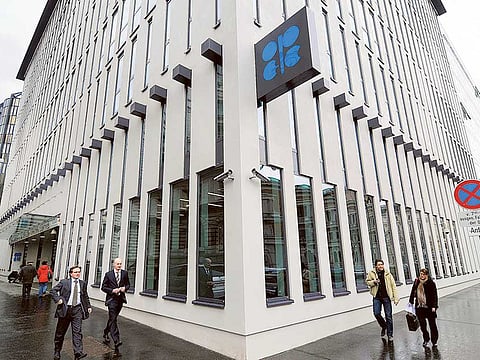Saudi Arabia floats idea to lift oil prices but Iran, Russia reject cuts
Saudis would agree to Opec output cuts of 1m bpd

Vienna: Saudi Arabia appears to have floated the idea of a global deal to balance oil markets and lift prices from around the lowest levels in six years although fellow producers Iran and Russia on Thursday rejected its main idea of cutting output.
Saudi Arabia, the largest oil producer in the Organisation of the Petroleum Exporting Countries (Opec), might propose members cut oil output by 1 million barrels per day next year if non-Opec countries joined in, industry publication Energy Intelligence reported.
A Saudi source said later the report was “baseless” but declined further comment and a source at Energy Intelligence said it stood by its story.
Saudi Arabia has long insisted it would cut production only if fellow Opec members and non-Opec countries joined in. The report quoted a senior Opec delegate as saying the Saudis would agree to cuts if Iraq freezes production rises and Iran and non-members such as Russia, Mexico, Oman and Kazakhstan contribute.
Any cooperation between Opec and non-Opec producers to tackle low oil prices would be the first since they joined forces 15 years ago to help the market recover from the 1998 financial crisis. Since then top non-Opec producer Russia has repeatedly resisted calls for joint action and grown its output by 70 per cent.
Russia, along with important Opec member Iran, which wants to increase output after years of Western sanctions, looked unlikely to change position. Opec will hold a policy meeting in Vienna on Friday with informal talks taking place on Thursday.
“We do not accept any discussion about increases of Iran production after the lifting of sanctions. It is our right and anyone cannot limit us to do it. We will not accept anything in this regard,” Iranian oil minister Bijan Zangeneh told reporters in Vienna.
“And we do not expect out colleagues in Opec to put pressure on us ... It is not acceptable, it’s not fair.” Iran will raise production by up to 1 million barrels per day following years of forced curbs because of the sanctions over its atomic programme, he added.
Russian oil minister Alexander Novak told local news agency RIA that he saw no need for Moscow to decrease oil production, adding that he did not expect Opec to change output policies at its meeting on Friday.
Budget squeeze
Saudi Arabia has been the main driver of Opec’s current policies to pump record volumes of crude to push higher cost producers, such as newcomers tapping into US shale, out of the market.
US has decreased over the past year but other producers such as Russia remained more resilient. As a result oil prices more than halved in the past 18 months, causing large budget shortfalls across most energy rich nations.
For Saudi Arabia, the prospect of big fiscal deficits has already prompted officials to float the idea of potentially unpopular reforms, including introducing value added tax and cutting energy subsidies.
Reduced oil revenue is also causing some of the influential business class to push Riyadh to quickly find an end to its expensive war in Yemen, the kingdom’s biggest strategic gambit in decades, and one that defines King Salman’s foreign policy.
Saudi Arabia’s proposal may also be seen as an attempt to head off calls for action from poorer Opec members such as Venezuela, but the conditions are tough to implement.
“It is very difficult to cut one million bpd collectively.
The Saudis do not want to change their previous talk. No cut without cooperation,” a Gulf Opec source told Reuters.
Oil prices rose from near their 2015 lows on the Energy Intelligence report, with Brent up by around 2 per cent to $43.29 by 1236 GMT, though traders said they were cautious.
“We would see this [idea of a deal] as an effort to provide psychological support to the market with slim chances of realisation,” JBC Energy said in a research note.
Sign up for the Daily Briefing
Get the latest news and updates straight to your inbox



